Nigeria. At the top of the crime world.
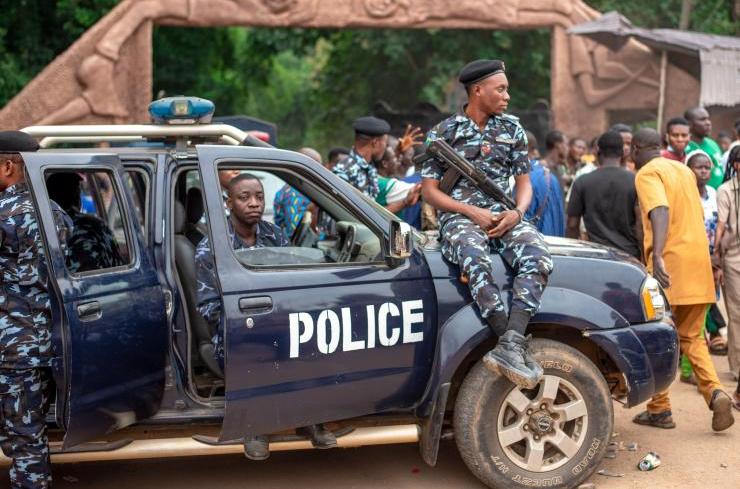
Africa’s most populated country and leading economy boasts the continent’s highest crime index and cumulates all superlatives as new forms of criminality are emerging.
Nigeria which ranked sixth in the world and first in Africa with a population of 236 million in early 2024 and also boasts the largest GDP on the continent, alongside South Africa and Egypt, holds a leading position in terms of criminality. According to the Global Initiative Against Transnational Organized Crime, the country ranks 6th worldwide with a crime index of 7.28, and second in Africa after the Democratic Republic of Congo (7.35) but ahead of South Africa and its gangs (7.18).
The range of crimes is extremely wide and is adapting to the evolution of society. In November 2023, the Nigerian Senate estimated the country’s annual loss caused just by cybercrime, including hacking, identity theft, cyber terrorism, harassment and internet fraud at $500 million.
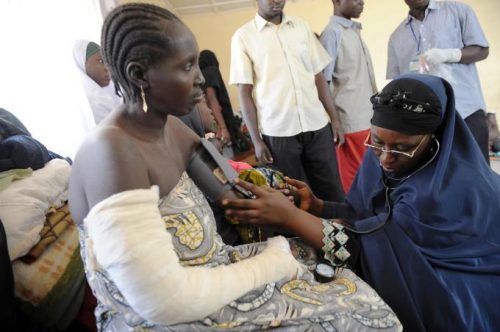
A woman is being attended to by a nurse in a clinic. Most hospitals have introduced a practice known as “family substitution”, in which patients must find a family member to donate the same amount of blood that has been used for them. File swm
Criminality is infiltrating the entire society. Poverty and the lack of health facilities have led to an enormous blood traffic. Blood shortages in hospitals have forced patients to find their private donors. The unmet demand for blood has generated a huge black market in which people donate blood for profit. Only one-third of the demand is collected through official channels. The rest of the blood is unchecked and therefore there is no guarantee that it is free from disease which is illegal according to the National Blood Service Commission.
This situation forced most hospitals to set up a practice known as “family replacement”, in which patients must find a family member to donate the same amount of blood that has been used for them. Most donors simply pose as family members and the hospitals do not bother to check IDs. The blood type does not always match. Commercial donors are contacted by middlemen who broker deals between them and the patients who buy the blood for $10 to $25 a pint and cash half of it. There are also private blood banks. In principle, illegal commercial blood donations carry a six-month jail penalty but few people are prosecuted.
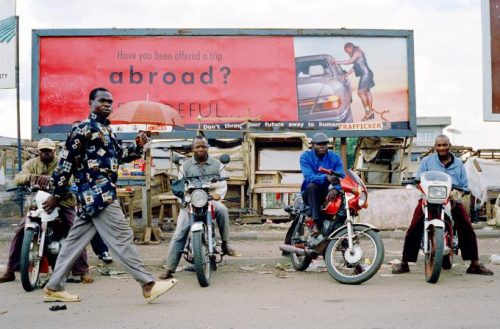
Lagos. A billboard warns of the dangers of being a victim of human trafficking. File swm
Human beings and their organs are another traded commodity. In 2021 the local press reported that such factories were on the rise, often disguised as private medical clinics, orphanages or social welfare homes which are part of a large industry that makes advantage of desperate teenagers with unwanted pregnancies or who are simply poor. Sometimes, women are kidnapped and raped and their babies are taken away from them, sold for adoption or trafficked to become
prostitutes or child labourers.
According to a joint report by the United Nations Office on Drugs and Crime (UNODC) and Nigeria’s National Institute for Security Studies published in 2022, in Enugu state, baby boys are sold for illegal adoption for between Euro 1,500 and Euro 3,000 while baby girls are sold for between Euro 1,000 and Euro 2,000.
This criminal business is part of the wider trafficking of persons. Nigerian women and children are the principal victims of both domestic and international trafficking. Between 2015 and 2018, about 6,350 victims were identified, including 1,680 in Western Europe. Most of the cross-border trafficking is perpetrated by transnational organised criminal groups for sexual exploitation. And of course, there is also the lucrative business of migration to Europe. Around 32,000 Nigerians were present in Libya as of April 2022 according to the International Organisation of Migration.
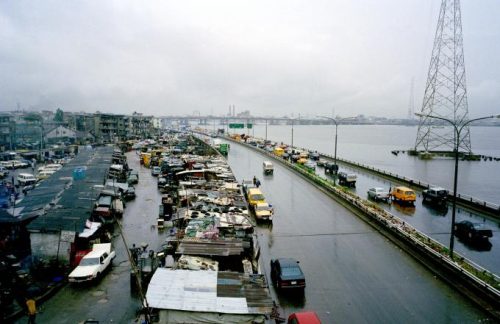
View of Lagos. Nigeria’s strategic location along global shipping routes between the Americas, Europe and Asia. File swm
Nigeria’s strategic location along global shipping routes between the Americas, Europe and Asia, its large-scale transport infrastructure, and its porous borders make it an attractive platform for criminal organisations which use it as a base for drug trafficking operations. Nigeria has become a transit hub for the South American cartels to smuggle cocaine and heroin into the European Union.
While cannabis is the only drug cultivated domestically, synthetic, Nigerian criminal organisations are increasingly producing illicit synthetic opioid drugs such as methamphetamine with a total of 16 labs seized by the Nigerian Drug Law Enforcement Agency over the period 2011-2019, reports UNODC.
Synthetic opioids represent a market worth more than $ 1 billion annually. This production of opioids is connected with the import of tramadol from Southern Asia which is used non-medically. Methamphetamine is then reexported to Japan, to the Philippines or elsewhere. According to the US State Department, one kilogram sold $ 7,500 in Nigeria can be re-sold for $ 250,000 in Australia.
Oil theft, refining and dealing are one of the country’s most important economic activities. In 2023, the Nigerian army destroyed 233 illegal refineries in the four states of Akwa Ibom, Cross River, Delta and Rivers and arrested 1,112 suspected oil thieves. The troops also impounded 72 trucks and recovered more than 356 arms and ammunition, say military sources. Oil theft and the related sabotage of pipelines to siphon the crude are causing a loss of more than 200,000 barrels per day, according to the Nigerian National Petroleum Company.
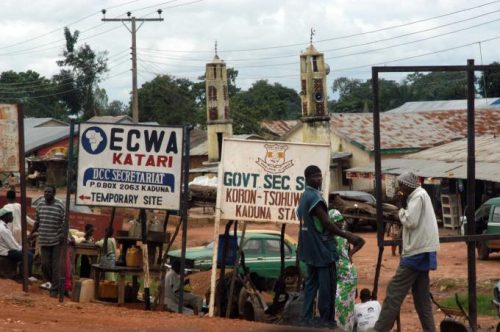
A lot of kidnappers operate on the highways, especially between Abuja and Kaduna. File swm
The Stakeholder Democracy Network, which supports local populations affected by extractive industries, has described two methods to steal oil. One consists of diverting oil from a pipeline to convey it by smaller pipes to barges which either supply local refineries or bring the crude to larger vessels that refuel tankers in the high sea.
The second technique, called “topping”, consists of adding undeclared crude to a shipment for which the export permits have been issued. Sources in the Niger Delta say that bunkering activity cannot stop because the military and the police are involved. Some speak of a “sophisticated mafia of powerful Nigerians and foreigners”, including also government officials, retired oil industry personnel, politicians and businessmen. One of the consequences of this theft is the lack of safety in these operations. In April 2022, a blast at an illegal oil refinery on the border of Nigeria’s Rivers and Imo states killed 100 people. Such incidents are frequent.
Piracy is endemic along Nigerian coasts. Before the amnesty granted to Niger Delta militants in 2010, most attacks were robberies. Between 2011 and 2016, oil tankers were targeted for hijacking to offload the content. After 2016, began a wave of kidnappings for ransom, targeting crews rather than cargo, reports UNODC. In 2020, 23 kidnapping attacks at sea were reported. Maritime crime is rooted in unemployment and environmental grievances. Fishermen unable to make a living in contaminated waters are increasingly preying on maritime commercial flows. Some of the hijackings are politically directed. Ironically, criminal groups also provide escort services.
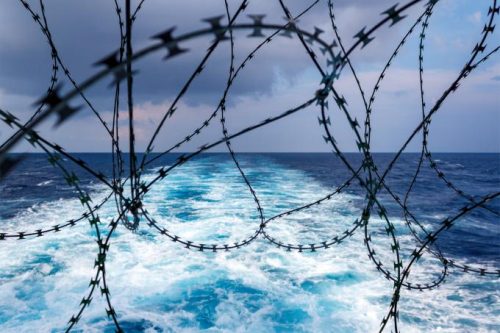
Close-up view of ship’s stern fortified with razor wire. Anti-piracy protection. Shutterstock/Jouni Niskakoski
Yet, Nigeria has several distinct kidnapping problems. According to the Armed Conflict Location and Event Database, the number of incidents quadrupled between 2019 and 2021. Kidnapping is associated with banditry and political violence. The number of abductions has soared from 28 in 2015 to 413 in 2021 and the number of victims raised from 900 to 5,287 during the same period. The more important incidents were the kidnapping of 344 schoolboys in Kankara (Katsina state) in 2020 and the kidnapping of 277 schoolgirls in Jangebe (Zamfara state) in 2021. Sometimes kidnappers, disguised as policemen also operate on highways, specially between Abuja and Kaduna.
Despite it has little wildlife left Nigeria has become an important wildlife trafficking hub. Before 2014, most African ivory came out of East Africa while most pangolin scales emanated from Central Africa. Since then, despite being home to less than 0.2 percent of the world elephant population, over 25 percent of all seizures of elephant tusks around the globe between 2015 and 2019 could be traced back to Nigeria. Vietnamese customs also seized in February 2022 6.2 tons of pangolin scales shipped from Lagos.
All these groups and their activities are often intertwined. According to the UNODC report, cult-related violence of brutal mafias, seeped in secrecy and blood rituals are common in the Rivers, Edo and Lagos states. Junior confraternities recruit among unemployed youth and out-of-school children even secondary school students who join also street gangs used for political agitation with names such as Black Axe or Vikings Confraternity. One of these groups called the Icelanders became involved with the militant group Niger Delta Vigilante Service.
The range of activities is wide and includes revenge attacks, attacking other cults, oil theft, refining and dealing, attacking political enemies, forcing businesses to pay protection, drug dealing, selling guns, disrupting elections, pimping prostitutes, etc. Sometimes, politicians who are themselves cult members use these groups during elections for services such as causing chaos to suppress voter turnout, stealing ballot boxes, or killing opponents. (Open Photo: Nigerian Police.123rf
François Misser



